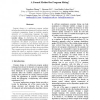890 search results - page 16 / 178 » Programming language methods in computer security |
128
click to vote
ASWEC
2005
IEEE
15 years 7 months ago
2005
IEEE
Program slicing is a well-known program analysis technique that extracts the elements of a program related to a particular computation. Based on modular monadic semantics of a pro...
121
click to vote
CSFW
2004
IEEE
15 years 6 months ago
2004
IEEE
Non-interference is a high-level security property that guarantees the absence of illicit information leakages through executing programs. More precisely, non-interference for a p...
SSS
2009
Springer
15 years 8 months ago
2009
Springer
This paper studies the development of autonomic and secure Virtual Organisations (VOs) when following the chemical-programming paradigm. We have selected the Higher-Order Chemical ...
102
click to vote
HASKELL
2008
ACM
15 years 3 months ago
2008
ACM
Protecting confidentiality of data has become increasingly important for computing systems. Information-flow techniques have been developed over the years to achieve that purpos...
114
click to vote
CCS
2009
ACM
15 years 9 months ago
2009
ACM
We enforce information flow policies in programs that run at multiple locations, with diverse levels of security. We build a compiler from a small imperative language with locali...

